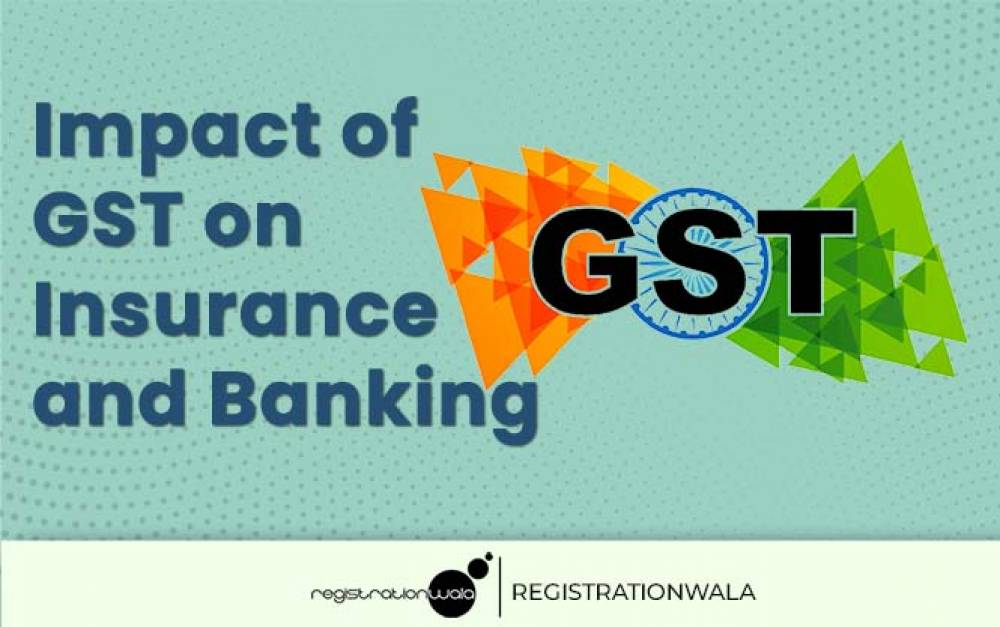Impact of GST on Insurance and Banking
- December 06, 2023
- Registrationwala

- Home
- /
- Knowledge Base
- /
- gst
- /
- GST Registration
- /
- Impact of GST on Insurance and Banking
Impact of GST on Insurance and Banking
With the launch of the Goods and Services Tax (GST) in India, the country has seen different reforms in the tax structure. The way the businesses operate changed, and the two sectors that went through significant changes are Insurance and Banking. Rules of GST are implemented in the services of banking and purchasing different insurance policies. In the article, the impact of GST on banking and insurance is shared, and which services are exempted from it.
What is GST?
The Goods and Services Tax (GST) is an integrated tax system that was launched on 1 July 2017 by the President of India. This tax replaced indirect taxes such as excise duty, service tax, value-added tax (VAT), etc.
GST is implemented on the supply of goods and services in India. It is charged on different stages or it is charged on every point where value is added. The act was passed in the Indian Parliament on March 29th, 2017 but came into force on July 1st, 2017.
Before the launch of GST, the taxation system was complex because of different indirect taxes. In the GST regime, the tax is levied on every intrastate and interstate. In the case of intra-state, the CGST and SGST are charged and in the case of inter-state, the integrated GST is charged.
Impact of GST on Insurance
The GST rates on insurance premiums have changed and now it is fixed at 18% which eventually increases the cost of insurance policies. With the change in the price, the GST also changed the way insurance companies operate. Here are some changes:
- Before the GST, insurance companies paid service tax on various expenses such as rent and legal fees. These costs are not eligible for input tax credit under the GST regime. So, the insurance companies start negotiating pricing with their vendors to lower service costs.
- Under GST, policyholders are taxed at 18%, up from 15% previously. This has resulted in higher insurance costs for policyholders.
- Before GST, different states had different tax rates on insurance products. But now, there’s a flat rate of taxation across the country. This made all insurers the same, regardless of the state in which they operate.
Detail of GST Rates on Insurance Policy Applicable from April 1st, 2023
Insurance Policies Exempted from GST
The following policies are exempted from Goods and Services Tax:
- Aam Aadmi Bima Yojana
- Pradhan Mantri Jan Dhan Yojna
- Varishtha Pension Bima Yojana
- Insurance is provided to the Navy, Army and Air Force by the state and central government
- Pradhan Mantri Vaya Vandana Yojna
- Janashree Bima Yojana
- Pradhan Mantri Jeevan Jyoti Yojana
- Any other State Government scheme recommended by the Government of India on the GSTC.
Is the Life Insurance Policy Income Taxable?
When buying a life insurance policy, it is important to consider various factors like the policy term, premium payment schedule, cash flow, insurance premium and salary. You can also look for the option of "tax exemption" on a life insurance policy from FY 2023-24.
Until March 31, 2023, the endowment life insurance plan or traditional life insurance plan (except ULIP) was subject to exemption. This means that all investments, earnings, and maturity of life insurance are not liable for paying taxes. Under Section 10(10D) of the Income Tax Act, income is also exempted, as long as the premium does not exceed 10% of the sum insured.
The scenario changed with the 2023 Budget, which increased the tax exemption based on endowment and life insurance policies issued on or after April 1, 2023. Now, there is no exemption on the life insurance policy, if the insurance paid on the policy crosses the limit of Rs. 5 lakh.
Impact of GST on Banking Industry
GST also has an impact on the banking industry and some of the changes are as follows:
- The GST tax rate on banking services has been increased from 15% to 18%. As a result, customers have to pay more for banking services.
- Before the GST, the banks did not have to pay taxes on services provided to other banks. But now, under GST, they have to pay GST on all services provided to other banks. This has increased the cost of interbank transactions.
- Banks are now required to file more documents for various transactions under GST, increasing their compliance costs.
Banking Services Exempted From GST
Some services provided by the Reserve Bank of India (RBI) are exempt from GST tax.
- Transactions involved in loan, investment, and sale or purchase of foreign exchange from authorized dealers or foreign banks.
- No interest is charged on credit cards.
- Services provided by a business person to a bank and insurance company for rural branch accounts.
- Atal Pension Yojana services and pension schemes come under the state government.
- All payments of state governments, central governments, or central provinces. Or the payment in accounts under the Pradhan Mantri Jan Dhan Yojana.
- Transferring up to Rs 2,000 in a single transaction using a credit card, debit card or any other payment card transaction.
Conclusion
To conclude, with the implementation of GST, major changes have been made in the insurance and banking industry. The way of operating business has changed and the cost of policy to the policyholders has increased. The impact of GST on the insurance and banking industry is mixed, both the advantages and disadvantages are affecting the industry. To register as an insurance company and complete the registration, reach out to Registrationwala. From application to obtaining a certification.
- 1948 views
